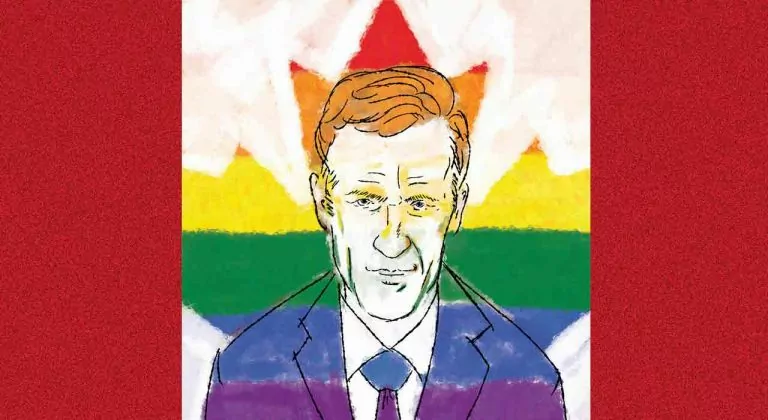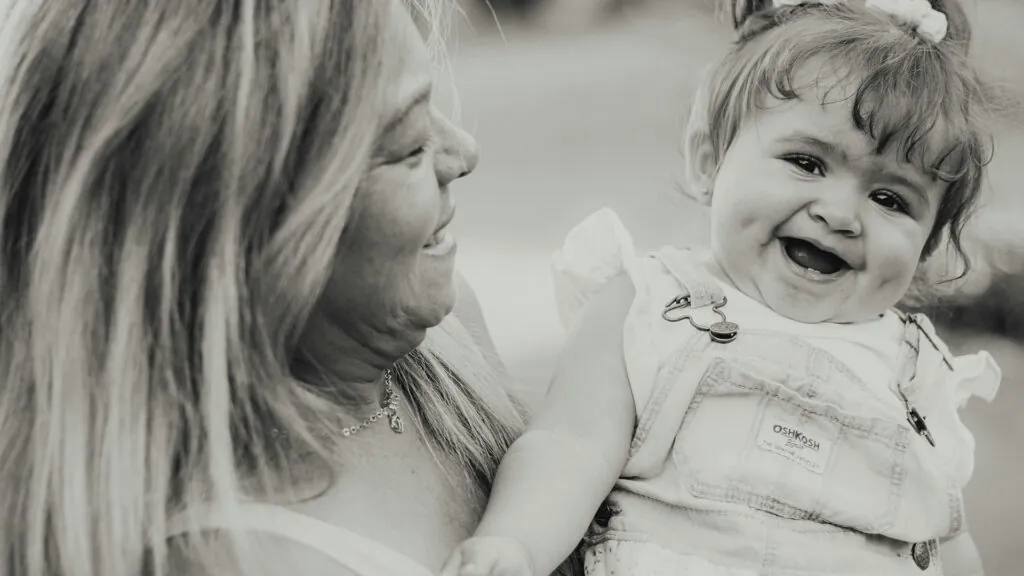It’s hard to conceive of any way that a Christian politician could, in today’s Canada, win a mandate to turn the country in a Christian direction. So if seizing power seems an unreachable goal, is there any other means by which Christians could prove influential in the political sphere? Yes. As Svend Robinson proved, you don’t need to be in government to have enormous influence – you just need to be fearless, dedicated, hardworking, and outspoken. And did we mention fearless?
Svend Robinson was by far the most influential opposition Member of Parliament in Canadian history. He was not a force for good, however; Robinson used his influence to push Canada to the Left, especially on social issues. He was the first openly homosexual elected politician in Canada, and also worked to expand abortion rights, and legalize assisted suicide.
Robinson’s life and influence are chronicled in Graeme Truelove’s 2013 book Svend Robinson: A Life in Politics. Truelove is an adoring fan including only the occasional bits of criticism, and that from other left-wing critics, like some of Robinson’s NDP colleagues who did not appreciate his brash and publicity-hungry style. Still, Truelove’s book gives us a look at how much can be accomplished by a politician unconcerned with playing it safe.
Early life
Svend Robinson was born in Minneapolis, Minnesota on March 4, 1952. His parents were both left-wing activists and his father was an English professor. However, according to Truelove, Robinson’s father was also an alcoholic with an anger problem, and had a hard time holding onto a job. As a result, the family moved frequently, mostly within the United States. Then in 1966, in conscientious objection to the Vietnam War, Robinson’s family moved to Burnaby, BC where his father got a position at Simon Fraser University.
From an early age Svend Robinson demonstrated that he was intelligent, driven and as Truelove puts it, he had a “monumental capacity for hard work.” In 1972 he won the University of British Columbia’s (UBC) most prestigious award. He was appointed to a BC government commission on post-secondary education in 1974 and subsequently to the UBC Board of Governors in 1975. He was still in his early twenties.
For most of his student years at UBC Svend was married to a women, Patricia Fraser. Eventually, however, he gave in to his homosexual urges and his marriage ended. He graduated from UBC with a law degree in 1976 and then spent a year at the prestigious London School of Economics in England.
All through this time Svend had been active in numerous left-wing causes and organizations including the New Democratic Party (NDP), as both the president of BC Young New Democrats, and as a member of the Provincial Executive and Federal Council of the NDP.
NDP candidate
Returning from England, Robinson became the NDP candidate for Burnaby’s federal riding in 1977. Working as a lawyer during the day, he spent much of his free time campaigning for a federal election that wasn’t held until 1979.
As a young, first-time candidate, Robinson tried to get support wherever he could. Truelove notes that Robinson:
“used his socialist background to personally convince the Burnaby Club of the Communist Party not to run a candidate against him, assuring him a handful of votes that could make the difference in a close race.”
On May 22, 1979, he won his seat in the federal election and became an NDP MP. His first private member’s bill proposed the complete decriminalization of abortion, which was still partially restricted at that time.
Prime Minister Joe Clark’s minority government fell a few months later and a new election was held in 1980. Robinson was re-elected. Pierre Trudeau became Prime Minister again and renewed his drive to change Canada’s constitution.
Robinson’s Charter influence
One of Trudeau’s main goals was to have a Charter of Rights and Freedoms added to Canada’s constitution. A special parliamentary committee was formed to carefully review the proposed Charter and to reshape it as necessary. Robinson was one of two NDP MPs on this committee. In this role, he had a crucial impact on the shaping of the Charter.
Robinson proposed numerous changes, some of which were adopted and some of which weren’t. His influence, however, was substantial. Truelove quotes journalist Michael Valpy as writing that Robinson, “perhaps more than any other opposition MP, has been the architect of the Charter of Rights.”
Robinson proposed adding “sexual orientation” to the list of protected categories in the Charter. That was rejected by Justice Minister Jean Chrétien. However, Chrétien said that future courts were free to interpret the Charter as if sexual orientation was protected. That would be up to the courts to decide. Chrétien’s caveat ensured that “future courts would be empowered to take evolving social mores into account and expand the list themselves.”
Today, few people remember the central role played by Robinson in the framing of the Charter. However, Truelove correctly notes that:
“an examination of Robinson’s contributions to the debate at the time, and of the ways in which the courts have embraced his point of view in the years since repatriation, suggests that his name deserves mention among the movers and shakers who crafted this defining feature of the Canadian legal landscape.”
Stacking the witness list
In 1985 the government of Prime Minister Brian Mulroney established a parliamentary subcommittee to seek public input on the Charter’s equality rights provisions. The committee would travel across the country holding hearings for this purpose.
Svend Robinson was appointed to this subcommittee. He immediately began to contact homosexual activists across the country to get them onto the list of presenters to the committee. Truelove writes that this tactic of “stacking the witness list” is common across the political spectrum. Whatever the case, Robinson successfully stacked the list with activists who would argue that homosexual rights should be protected by the Charter. In this way, politically-active homosexuals had a disproportionate influence on the subcommittee.
His tactic was very successful and the subcommittee’s report was overwhelmingly favorable to the homosexual rights cause. The Justice Department’s 1986 official response to the subcommittee’s report echoed its commitment to homosexual rights. This was a major success for the gay rights movement in Canada.
Friend of Morgentaler
Brian Mulroney and the Progressive Conservative Party had come to power in the federal election of 1984. Robinson had been re-elected at that time. Besides his efforts on behalf of homosexual rights, he also pushed hard for the liberalization of Canada’s abortion law, proposing bills to that effect. Furthermore, Truelove writes that Robinson:
“worked closely with pro-choice advocate Dr. Henry Morgentaler (one pamphlet circulated by opponents in Burnaby called him Morgentaler’s ‘best friend’ in Parliament) and accompanied him to the Supreme Court in 1988 as Morgentaler appealed his conviction for performing illegal abortions.”
The 1988 Morgentaler decision struck down any legal restrictions on abortion in Canada. It came out in January, and the following month Robinson, for the first time, came out publicly as a homosexual. He was the first elected official in Canada to do so.
Many people believed that his public “outing” would hurt his political career, but they were wrong. The culture had changed enough that a significant body of opinion supported him. In fact, donations to his NDP riding association poured in from all over Canada, and it raised more money for the 1988 federal election than any other NDP riding association. That would also be the case in subsequent elections.
Assisting suicide
Besides abortion and homosexuality, Robinson worked hard on behalf of assisted suicide. He supported a woman named Sue Rodriguez who had a debilitating disease and challenged the criminal prohibition on assisted suicide in court. She argued that the prohibition violated her Section 7 Charter right to security of the person.
Rodriguez lost in a 5-4 Supreme Court decision in September 1993. The prohibition on assisted suicide was ruled to be constitutional. In spite of the decision, Rodriguez wanted to proceed with an assisted suicide anyway. As Truelove relates, she:
“needed someone else to help her end her life when the time came, so she asked Robinson. He felt privileged to be asked, and despite the serious legal risk, he agreed to help.”
He was the only person with her when she died in 1994 but he was not charged with any crime due to a lack of evidence.
He continued to push unsuccessfully for the legalization of assisted suicide. His 1997 parliamentary motion to create a committee to write legislation legalizing physician-assisted suicide was overwhelmingly defeated in the House of Commons.
Leadership campaign
In 1989 Robinson supported Yukon MP Audrey McLaughlin in her campaign to be the federal NDP leader. She won the leadership but the party lost most of its seats in the 1993 election. She resigned in 1994 and the following year Robinson launched a campaign to become NDP leader. He represented the most extreme left-wing faction of the NDP.
Among his early supporters was future NDP leader Jack Layton. A Toronto city councilor at the time, “Layton was put in charge of fundraising, and the Ontario campaign was launched in the living room of the home he and [Olivia] Chow shared.”
The leadership convention was held in October 1995. With three candidates for the leadership, Robinson finished first on the initial ballot ahead of second-place Alexa McDonough and third-place Lorne Nystrom. Nystrom intended to have his delegates support McDonough to block Robinson’s path to the leadership. Sensing defeat, Robinson decided to concede to McDonough before the second ballot was held as a way to unite the party. It didn’t work.
McDonough and her people thought that Robinson was trying to upstage them by throwing the convention to her. This led to continuing rifts within the party between McDonough and Robinson. And many of Robinson’s supporters were outraged that he conceded defeat after winning the first round of balloting.
Spinning a hiking accident
On December 31, 1997, Robinson was hiking alone on Galiano Island in BC and fell off an 18-metre cliff. He was severely injured. Concerned he might die alone in the wilderness, thoughts of his Cuban lover, Max Riveron, inspired him to muster all of his strength to try to find help. He was successful and subsequently recuperated in hospital.
This was a terrible experience, of course. But Truelove writes that Robinson saw a potential political benefit:
“He hoped that he could use the story of his fall to demonstrate that the love between homosexual partners was as real and as powerful as the love between heterosexual partners.”
Homosexual rights achievements
In the early part of the 2000s, same-sex marriage became a major issue in Canada. Unsurprisingly, “Robinson was acknowledged as one of the leaders of the same-sex marriage movement.”
However, he was actually more concerned about adding “sexual orientation” to the law against hate propaganda. He introduced his own bill, C-250, in 2002 to accomplish this goal. Despite the fact that it was a private member’s bill, it was passed by the House of Commons in September 2003 and by the Senate in April 2004. According to Truelove, “Today he keeps a framed copy of the bill hanging over his desk at home.”
Becoming a thief
After years of highly effective political work, Robinson’s career came crashing down when he stole an expensive piece of jewelry.
The spring of 2004 was a very significant time for Robinson. On March 20 a special event was held in Vancouver to celebrate his 25 years in Parliament. The speaker for the occasion was the world-famous left-wing American intellectual Noam Chomsky. The 2,500 attendees gave Robinson a standing ovation. This was the height of his career.
However, three weeks later, on April 9, Robinson stole a ring valued at $21,500 from a jewelry auction in Vancouver. He just took the ring, put it in his pocket and went home. Subsequently, he was overcome with guilt and turned himself in, apologizing profusely for his crime.
The fallout ended his political career. As Truelove relates:
“If the Office of the Attorney-General had announced it was satisfied with Svend’s apology, and that he wouldn’t be charged, he might have run again. But no such announcement came, and he was left in limbo”
A federal election was imminent and Robinson had to let someone else run in his place.
Eventually he was charged. Interestingly, Truelove implies that the government was pushed into charging Robinson by a conservative organization:
In mid-June an Alberta-based lobby group, run by publisher and former Reform Party activist Link Byfield, ran an ad in The Province which read, ‘Two months ago MP Svend Robinson was caught stealing. Will he be charged with theft?’ With one week to go in the election campaign, Svend was charged.
Why did he do it?
In the wake of this scandal Robinson was diagnosed with bipolar disorder. His supporters explained the theft as being a result of his anguished mental state, or the stress he experienced from encountering virulent homophobia.
Strangely, despite being an ardent atheist, Robinson himself explained his criminal behavior in a rather Christian way. When asked about the theft by Truelove, Robinson replied:
“In all of us there’s, you know, there’s bad and good. Maybe this was bad. Maybe I just, you know – temptation overcame me. I don’t know.”
Robinson tried to make a political comeback by running for the NDP in Vancouver Centre in the 2006 federal election. He was soundly defeated by the sitting Liberal MP.
Subsequently, Robinson and Max (who got “married” in 2007) moved to Switzerland where Robinson works as the senior advisor for parliamentary relations at the Global Fund to Fight AIDS, Tuberculosis and Malaria.
Conclusion
Truelove is correct in writing that Robinson was “more effective than perhaps any other opposition MP of his generation.” His hard work and determination led to numerous accomplishments in pushing Canada to the Left. Robinson was a “superhero for left-wing activists.”
Robinson’s success and influence in Canada are unmistakable. However, it’s interesting to note how Robinson’s career crashed and burned immediately after he reached the pinnacle of success. His 25-year parliamentary anniversary, with adoring crowds and celebrity endorsements, was soon followed by a criminal act that ruined his career and severely tarnished his legacy. Perhaps the end of his career can be compared to that of a political leader mentioned in the Bible who was also at the height of power when “he was brought down from his kingly throne, and his glory was taken from him” (Daniel 5:20, ESV).
But there is a more important point to consider. What made Robinson so effective? And what can we learn from his approach?
He succeeded because of his commitment to his principles. Make no mistake – Robinson is a godless man, but most certainly a principled one. And what his career demonstrates is that a clear commitment to principles, and a determination to advance those principles, can be an effective political strategy. He would not stop talking about the issues that mattered to him. His outspokenness meant he could never have become prime minister but it also meant that while others politicians were too careful, too tactical, or simply too cowardly too speak out, Robinson was being heard.
A principled politician may not be able to rise to the highest positions of power, but what Robinson shows us is that such a politician can still be an influential player who makes a distinctive contribution to the direction of the country.
We would do well to imitate his fearless, principled, outspoken approach.











